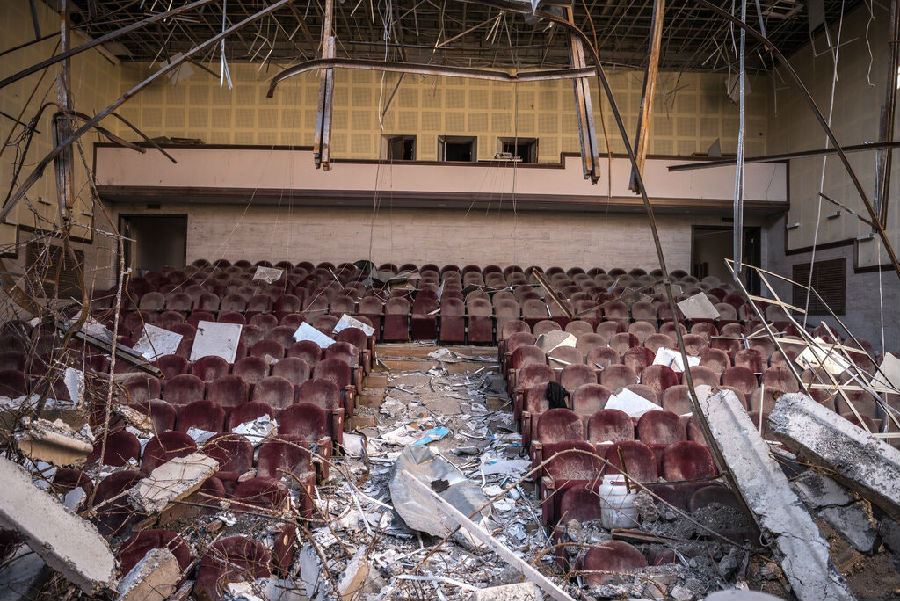"You knock down one guy, and they don't run away," said a soldier back from the front, Tigran Saakyan, dressed in a brown-and-tan knit sweater under his military jacket.
“就算你打倒了一個人,他們也不會逃命,”從前線回來,軍裝里穿著一件棕褐色針織毛衣的士兵提格蘭·薩基安說道。
"You knock down a second guy, you knock down a third guy, and they keep coming anyway — coming like robots."
“你又撂倒了一個,又撂倒了一個,不管你拿他們怎么樣,他們都還是會繼續沖過來——就像機器人一樣。”
At a military base in Stepanakert, Mr. Saakyan and his comrades,
在斯捷潘納克特的一個軍事基地,薩基安和他的戰友們——
some of them in their 50s, were waiting to be blessed by military clergy.
有一些已經50多歲了——正在等待接受軍方神職人員的賜福。
Narek Petrosyan, a deacon in the Armenian Apostolic Church,
納雷克·彼得羅相是亞美尼亞使徒教會的一名執事,
said that when soldiers' relatives call him asking for word from the front,
他說,有軍屬打電話給他詢問前線的消息時,
he tries to give them hope, even if he knows that their loved ones have died.
即便他知道他們的親人其實已經犧牲了,他也會盡力讓大家心懷希望。
A separate group of clergy is charged with delivering that news.
另一組神職人員則負責傳遞士兵陣亡的消息。
"We tell them that this is a holy war, and we are prepared to sacrifice our lives for each other," he said.
“我們對大家說,這是一場圣戰,我們已經準備好了為彼此獻出自己的生命,”他說。
More than 700 Armenian soldiers have already been killed, along with scores of civilians on both sides.
目前,亞美尼亞方面有700多名士兵犧牲,雙方各有數十名平民喪生。
Azerbaijan has not been disclosing its military death toll.
阿塞拜疆一直沒有披露他們軍方的死亡人數。
But the government said Saturday that 14 civilians were killed in Ganja, Azerbaijan's second-largest city, in an overnight missile attack by Armenia.
不過,其政府周六表示,阿塞拜疆第二大城市甘賈有14名平民在亞美尼亞趁夜發動的導彈襲擊中喪生。
Officials say that more than half the people of Nagorno-Karabakh have fled their homes,
當局官員表示,納戈爾諾-卡拉巴赫半數以上的人都已經逃離家鄉,
though the martial law currently in effect bars men of military age from leaving the territory.
盡管目前實行的戒嚴令禁止滿足征兵年齡的男性離開該地區。
Those who stayed behind include women who want to be close to their husbands, sons and fathers sent to the front lines.
留下來的人群中有一部分是希望離被派往前線的丈夫、兒子或父親更近一些的女性。
The coronavirus is far down the list of people's worries,
相比之下,人們對新冠病毒的擔憂反倒很少,
even though international aid organizations warn that cramped bomb shelters are spreading infection.
盡管國際援助組織警告稱,感染已經在擁擠的防空洞里傳播開來。

Alyona Shakhramanyan, 33, and her neighbors from the fifth floor of an apartment building in Shusha, the hilltop town,
現年33歲的阿莉奧娜·沙克拉曼揚原本住在山頂小鎮舒沙一棟公寓樓的五樓,
moved three weeks ago into a section of their dirt-floor basement.
三周前,她和同一樓的鄰居一起搬進了地面還是黃土的地下室的一角。
They fashioned a door out of a sheet of corrugated plastic and taped cardboard over the openings in the concrete walls.
她們用一張瓦楞塑料板和用膠帶固定的紙箱在混凝土墻上的開口處做了一扇門。
One of the women is sick — a cold, they say, that she caught because of the drafty air.
她們中間有一名姐妹生病了——她們說是因為通風不暢導致的感冒。
Ms. Shakhramanyan's brother, who, like her husband, is at the front, has not been answering his phone.
沙赫拉曼揚的哥哥,和她的丈夫一樣都上了前線,一直沒有接聽他的電話。
When she went outside to do laundry the previous day, she was frightened by the buzz of a drone.
前一天她出門洗衣服時被無人機的嗡嗡聲嚇壞了。
Rocket artillery hit the nearby Holy Savior Cathedral twice earlier this month,
本月早些時候,火箭炮兩次擊中了附近的圣救主大教堂,
and the paving stones outside it were still stained with the blood of a Russian journalist critically injured in the second strike.
教堂外的鋪路石上現在還有在第二次襲擊中受了重傷的俄羅斯記者的鮮血。
"No one helps us here," Ms. Shakhramanyan said.
“沒有人來幫我們,”沙赫拉曼揚說。
"We are on our own."
“我們只能靠自己。”
At the military cemetery in Stepanakert, the resting place of fighters who died in the 1990s,
安葬著上世紀90年代陣亡的將士的斯捷潘納克特烈士陵園里,
the authorities removed a retaining wall and dug into a hillside to make way for the new casualties.
當局拆掉了之前留著的一堵墻,沿著山坡挖起了新的墓穴,為的是安葬新傷亡的士兵。
Amid the artificial-flower wreaths and simple grave sites on the freshly graded, rocky dirt,
在夾雜著石子的墓地新壘起的簡單墓園里,在一片用假花制成的花圈中,
a man whose brother was gone spread his arms in grief.
一個兄弟剛剛去世的男子悲痛得攤開著雙臂。
"These are fresh — our guys," he cried, his voice trailing off.
“這些都是剛遇難的——都是我們的親人,”他哭喊著,聲音越來越弱。
"What is there to say?"
“我還能說什么呢?”
譯文由可可原創,僅供學習交流使用,未經許可請勿轉載。













